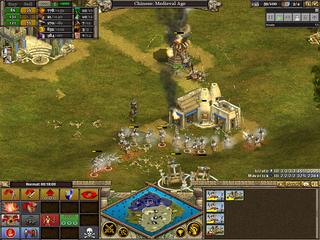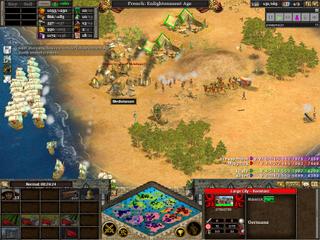
So, Britain has been remembering this terrible conflict among all the others. But arguably, World War 1 stands out as being one of the worst. Yet, why did such a war happen?
The unification of Germany in 1871 at the expense of France, who lost Alsace-Lorraine, inevitably changed the geo-political landscape in Europe. A new, powerful state had emerged in the centre of Europe that directly bordered Europe's other super powers France, Russia and the Austria-Hungarian empire.
Britain, also looked on as Bismarck did the dirty work over France. For Britain too, had a stake in Europe and wanting to maintain a stable balance of power in Europe. The emergence of Germany broke the balance of power that had been carefully constructed after the Napoleonic wars. Europe was no longer stable.
And so, Germany was unified and a second industrial revolution took place in the country. Not only did this see the rise of German industry, it also directly threatened Britain's commercial interests and certainly broke their world monopoly (along with America who were also experiencing industrialization). In the latter half of the 19th century Britain lost it's world lead.
France for their part now had to contend with a powerful neighbor on their border. A neighbor which had already taken territory off them and would soon overtake them economically. The future pattern had been set for Franco-German tension.
With Germany united, Bismarck was arguably the greatest statesman. As German chancellor subservient to a powerful monarch he would pursue an alliance system that he hoped would maintain the peace and serve German interests. In the most part, he sought to avoid angering both France and Russia in the event of being encircled. Recognizing that France were already angered he signed an insurance treaty with Russia that would ensure Germany's eastern border.
For the most part, this worked. But then of course, all things must end sooner or later and Bismarck was eventually dethroned as chancellor in 1890 when the next Wilhelm became king.
This had immediate impact. For starters, it was clear that the monarch wanted a greater say in international relations. More say than Bismarck could expect, for sure. A new course in foreign policy was therefore embarked on with Germany not renewing it's insurance treaty with Russia.

Germany would also embark on the persuance of an an empire like France and Britain. Known as Weltpolitik, Germany started to muscle in on French and British territory in Africa and the med sea. This led to further conflict with France over colonial possessions.
With Franco-German relations seriously strained diplomatic gestures were made towards Britain. Germany did not wish to see the two nations unite against her and also needed an ally of some description in the face of their lack.
But, as always Germany just couldn't help but annoy people. The introduction of Tirpitz and his navy league led to a German naval build up which directly challenged Britain's pre-eminent position at sea. Eventually, this prompted Britain to look towards France for an alliance against Germany.
As mentioned, Germany had already cancelled the diplomatic alliance with Russia. But they did have an alliance with the Austria-Hungarian Empire (and Italy also); a struggling old empire with considerable interests in the Balkans. The Triple Alliance was formed in 1882 - before the Reinsurance treaty with Russia was cancelled in 1890.
Russia too, had similar interests in the Balkan region and Germany aligning itself with Austro-Hungary had put them at a polar opposite. In short, the alliance with Austria-Hungary and the failure to continue to appease the Russians had ensured that a future conflict with them was a possibility.
With this in mind, the Russians moved towards the newly formed Britain and France partnership. The Triple Entente was formed. Otherwise known as the Grand Alliance between Britain, France and Russia. If one was attacked, the other would come to their aid.
So, Wilhelm 2nd had ensured that Germany were now surrounded by powerful enemies all with grievances of one description or another against her. Military spending increased in the short-period before 1914 and many believed that a European conflict involving a number of states would erupt.

And so on 28th June 1914, Mr Ferdinand was assassinated by a Serbian nationalist. The Austrians suspected the Serbians and mobilised their forces against Serbia. Russia, committed to protect Serbia mobilised their forces against Austria-Hungary. War between the two states/empires became likely.
The Germans being allied with the Austrians were expected to join in. But, it wasn't until the Russians mobolised their forces in anticipation of a German advance in the east that prompted Germany to declare war on Russia.
With war in eastern Europe now beginning. France and Britain could not look on forever. France's alliance commitments with Russia prompted Germany's declaration of war on France. The war in the west had now began.
Germany had anticipated the possibility of encircling by France and Russia. With this mind they had formulated a plan to quickly knock out the French and then the Russians. Their quick defeat of France required that they move through Belgium. Britain, not wanting war, were however committed to protecting Belgium neutrality. And so it was that when Germany moved into Belgium that Britain joined in with France and declared war on Germany. World War 1 was now in fall swing.

So, let us not forget the reasons for this war. Nationalist tensions - sparked off by the assassination - and the alliance system brought the major powers of Europe into a European wide conflict. On the one side, the Triple Entente between France, Britain and Russia. On the other, the central powers of Germany, Austria-Hungary and the unreliable Italians.
Of course, this war was supposed to settle the European question for good. To settle the political landscape if you like. The end result of the war, defeat for Germany and the dissolution of the Austria-Hungarian led to a whole host of new states being created in eastern Europe. The right to self-determination was being touted as an end-result of the war.
But of course Wilson's 14 points are one thing, the French are another. At Versailles they drew up the peace-terms for Germany which would drown the country with reparations repayments, loss of land and no real military to boot. Not a good thing for a newly formed German democratic government to inherit...
As for Wilhelm, he *#!ed off to Holland.
World War 1 - lest we forget.
 He's Gotta Go
He's Gotta Go
 Germany would also embark on the persuance of an an empire like France and Britain. Known as Weltpolitik, Germany started to muscle in on French and British territory in Africa and the med sea. This led to further conflict with France over colonial possessions.
Germany would also embark on the persuance of an an empire like France and Britain. Known as Weltpolitik, Germany started to muscle in on French and British territory in Africa and the med sea. This led to further conflict with France over colonial possessions. And so on 28th June 1914, Mr Ferdinand was assassinated by a Serbian nationalist. The Austrians suspected the Serbians and mobilised their forces against Serbia. Russia, committed to protect Serbia mobilised their forces against Austria-Hungary. War between the two states/empires became likely.
And so on 28th June 1914, Mr Ferdinand was assassinated by a Serbian nationalist. The Austrians suspected the Serbians and mobilised their forces against Serbia. Russia, committed to protect Serbia mobilised their forces against Austria-Hungary. War between the two states/empires became likely.





